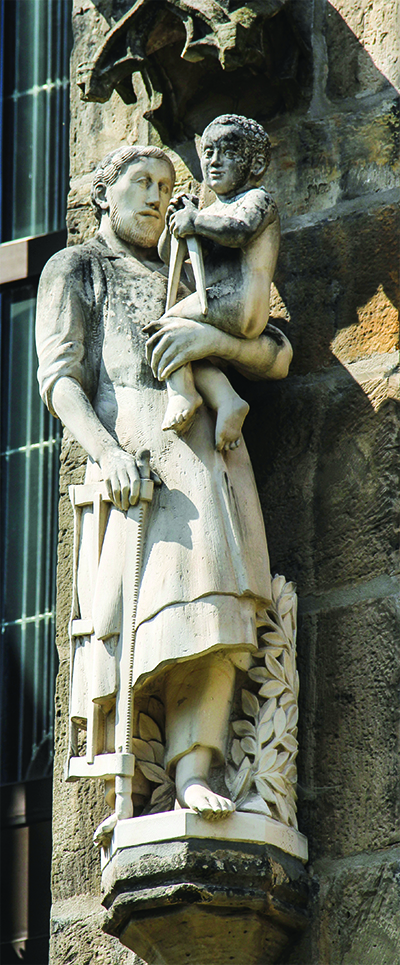
May saint: St. Joseph the Worker
St. Joseph – foster father to Jesus and devoted husband of Mary – is one of the people in Scripture about whom we know relatively little. What we do know, however, has resulted in the Church celebrating not one, but two feast days in his honor. The first and the one with the most ancient roots – as early as the fourth century — occurs on March 19. On this day, the Church recognizes Joseph’s role in salvation history as the protector and head of the Holy Family. The second is of more recent origin. In 1955, Pope Pius XII instituted the Feast of St. Joseph the Worker in response to the May Day celebrations for workers sponsored by the Communists, gatherings which often ended in violence.
While the Church has always championed the rights of workers – there have been at least six documents promulgating the dignity of work and the rights of workers in the last 132 years – such rights have not always been recognized or respected universally. As early as the 1880s, workers in the United States began to engage in protests and strikes calling for fair wages and working conditions. Unfortunately, though often beginning peacefully, on many occasions such gatherings were marred by violence and the deaths of both workers and police, as happened during the 1886 event known as the Haymarket Massacre.
By 1889, the International Socialist Conference declared May 1 “International Worker’s Day” to commemorate that day and, by the end of the century and the beginning of the next, “May Day” had become a day for international labor parades and protests, particularly following the Bolshevik Revolution in Russia.
As Cold War tensions increased during the 20th Century, Pope Pius XII sought to recapture the Church’s original teaching on the value of work and workers, linking it to the belief that human work is a participation in God’s own work of creation. He chose St. Joseph as the embodiment of that teaching, and the feast day he chose had a specific meaning within the context of current events.
“[As] the vicar of Christ,” he wrote, “we wish to reaffirm highly, on this day of May 1 … the dignity of work, and [to] inspire social life and laws, based on a fair share of rights and duties…[We have determined to] establish the liturgical feast of St. Joseph the Worker, assigning it precisely on the 1st of May … because the humble craftsman of Nazareth not only embodies the dignity of the arm of the worker … he is also the guardian of you and your families.”
By instituting this feast and placing it on the day that he did, the pope reclaimed the Christian dimensions of labor and, along with that, the Church’s insistence that workers be treated fairly and compensated justly in a prayerful and non-violent way.
In subsequent years, another pope, St. John Paul II, reaffirmed Pius’s decision in his encyclical, “Laborem Exercens,” which was a reflection on the true meaning and importance of human work.
The Feast of St. Joseph the Worker is May 1.
Sources for this article include:
aleteia.org/2017/05/01/why-is-there-a-feast-for-st-joseph-the-worker
catholicnewsagency.com/saint/feast-of-st-joseph-the-worker-471
franciscanmedia.org/saint-of-the-day/saint-joseph-the-worker
vaticannews.va/en/saints/05/01/st-joseph–the-worker–spouse-of-the-blessede-virigin-mary—pat.html

